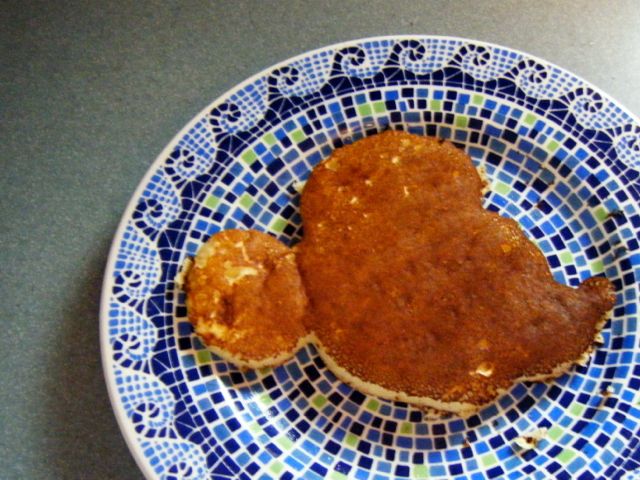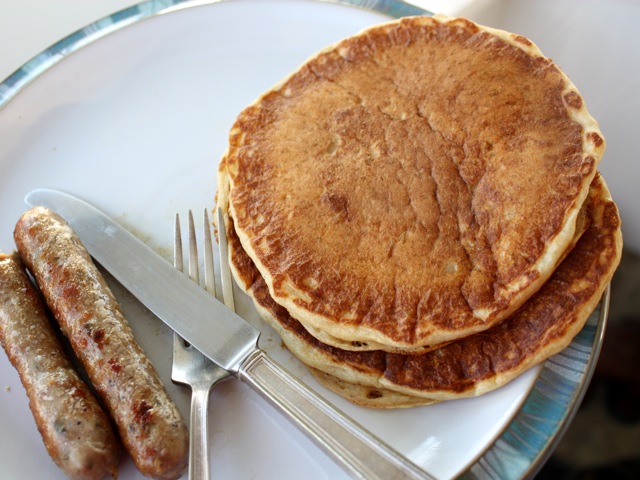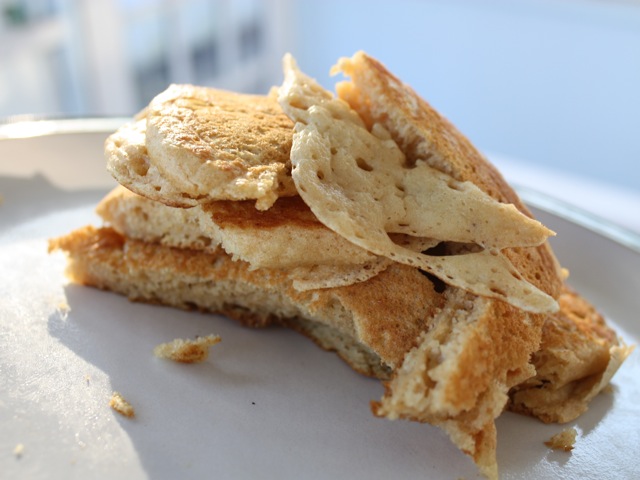
mousepancake, l
(article, Erica Dolson)
[%pageBreakSettings nobreak=true][%adInjectionSettings noInject=true] My family never ate breakfast together. Dinner, yes. Lunch, occasionally. But breakfast? Never. We were a family of staggered risers. My father usually got up, showered, dressed, and cooked and enjoyed a solitary breakfast long before the eyelids had begun to twitch on the rest of us. My sister and I never rose just after dawn to sneak downstairs and watch early-morning cartoons; we always slept past nine o’clock. My mother woke sometime in between and basked in a luxurious, uninterrupted cup of coffee while she read the newspaper. [[block(sidebar). h1.Featured recipes]] She always sat calmly, undisturbed by the progressive flurry of activity around her: my father leaving to get a haircut, as he regularly did on Saturday mornings; my sister descending the stairs from her bedroom; me choosing a cereal. Often, as my mother sat at the table in her bathrobe (blue cotton in the spring and summer, red fleece in the fall and winter), with her empty breakfast dishes pushed aside just so and the newspaper spread open before her, she told us, “This is my favorite time of day.” One morning, however, I awoke to unusual sounds and smells: butter sizzling, sugar caramelizing. Puzzled, my sister, father, and I assembled ourselves at our usual places around the kitchen table: my sister and I each along a side, my father at the head of the table closest to the sliding-glass door leading to our deck. Behind that pane of glass we could always see the brightness of a sunny day, the gray overcast skies of winter, or the trees swaying in a strong wind. But none of the elements ever invaded the shelter of our kitchen, the room my mother always described as the heart of the home. [%image mousepancake float=right width=400 caption="Mickey Mouse, in profile."] That morning, my mother strode from the stove to her chair at the end of the table, across from my father. She carried two plates. As she set them down — one in front of me, one in front of my sister — I saw that each one held a pancake, perfectly centered, perfectly golden-brown, and perfectly and unmistakably cut into the shape of Mickey Mouse’s famous silhouette. “We’re going to Disney World!” my parents announced. During our stay in Florida that fall, I encountered other Mickey Mouse-shaped confections: ice-cream bars with creamy vanilla centers and hardened chocolate exteriors, huge lollipops formed from spirals of sugar that appeared to have been tie-dyed. On the plane ride home, the flight attendant even served Mickey Mouse pancakes. But these three pancakes, arranged in the triad of the famous mouse and placed on a plastic tray, seemed less refined, less thoughtful, less special than the single, wonderful, Disney-inspired pancake my mother had created with a cookie cutter and served me just weeks before. [%image scraps float=left width=400 caption="A pile of pancake scraps."] As a child, I loved pancakes. They tasted like dessert, but nourished like a full meal. The plain batter embodied the simplicity of childhood. Pancakes, in many ways, were my youth: fluffy, light, yummy, sweet, sticky, and messy, but also fun and safe. Parents were different. The morning of the big announcement, I noticed that my mother’s plate lacked a Mickey Mouse of its own. Her plate instead featured an asymmetrical pile of pancake cut-outs: a sharp, flat divot, cut from between Mickey's ears; the curved sliver of a new moon, trimmed from Mickey’s round face. She ate the pancake scraps, the leftovers, the non-Mickeys — but little artworks in their own right, too. I doubt she missed having Mickey on her plate. Now that I am grown, family breakfasts are still rare. We aren't often all together in the same house. But when we are — sitting around the dinner table, four grown-ups now, in the same self-assigned arrangement we have always kept — we wait for my mother to mark the occasion with an announcement: “Tomorrow, I think I will make breakfast.” p(bio). Erica M. Dolson is an MFA candidate at George Mason University in Fairfax, Virginia, where she also teaches in the university's English department. She previously worked as a newspaper reporter and columnist in central Pennsylvania; this is her first published essay.

mousepancake, l

reference-image, l

scraps, l

feature-image, l

featurette-image, l